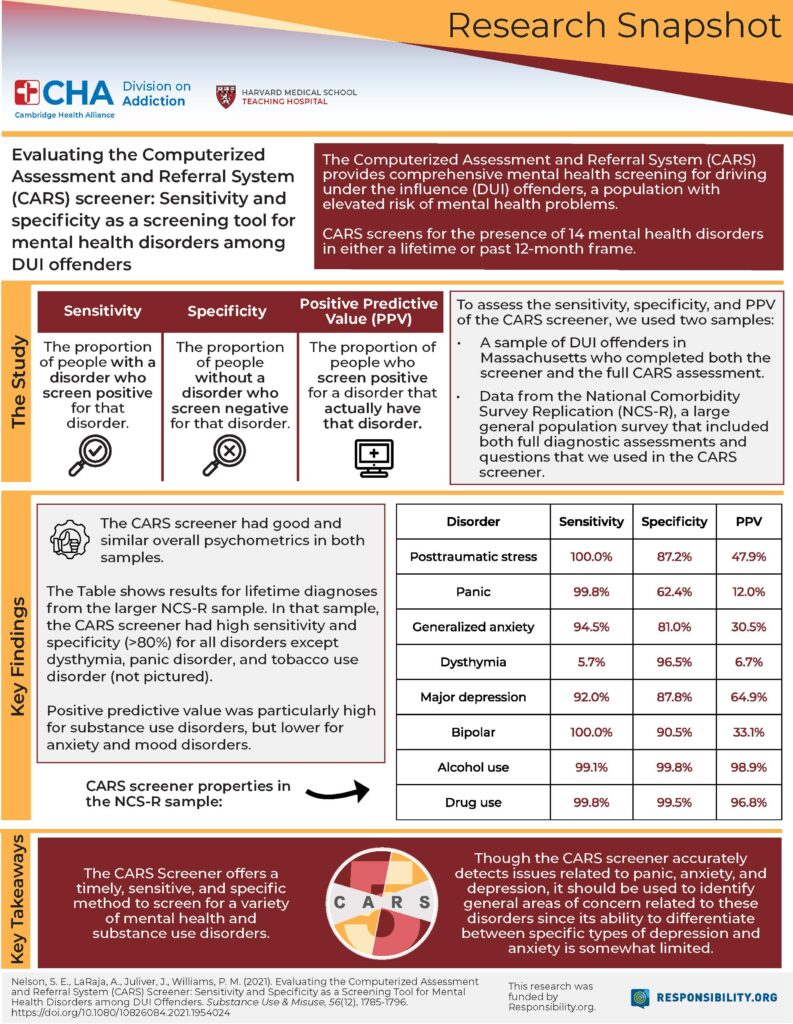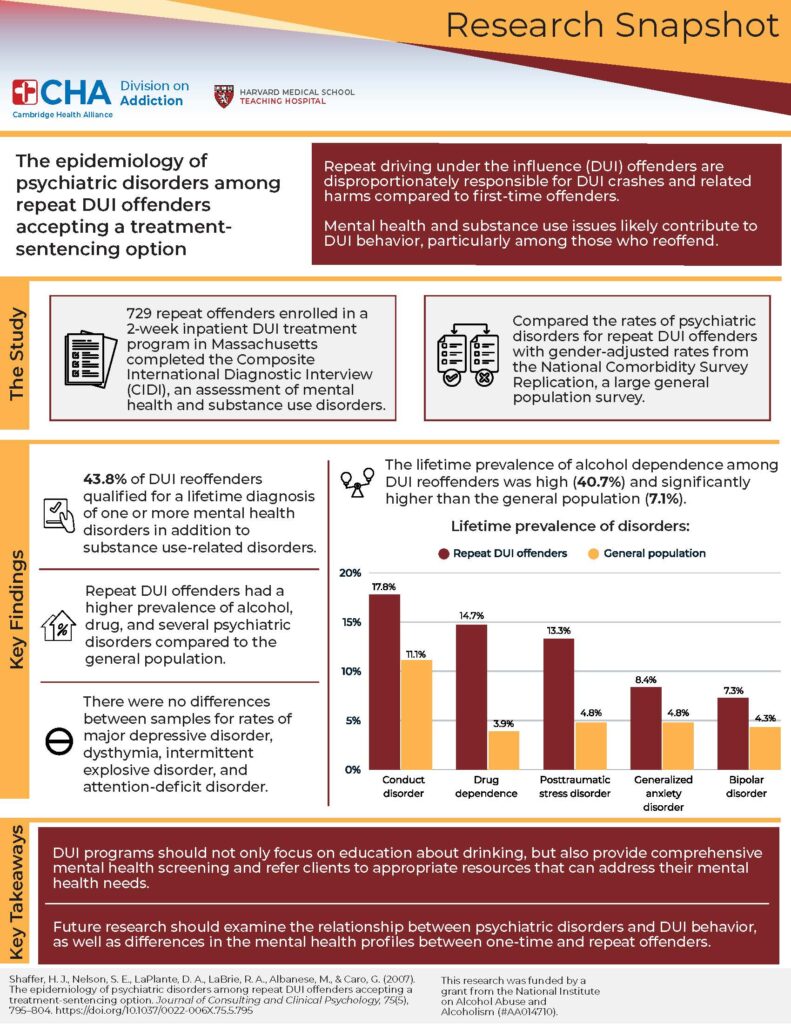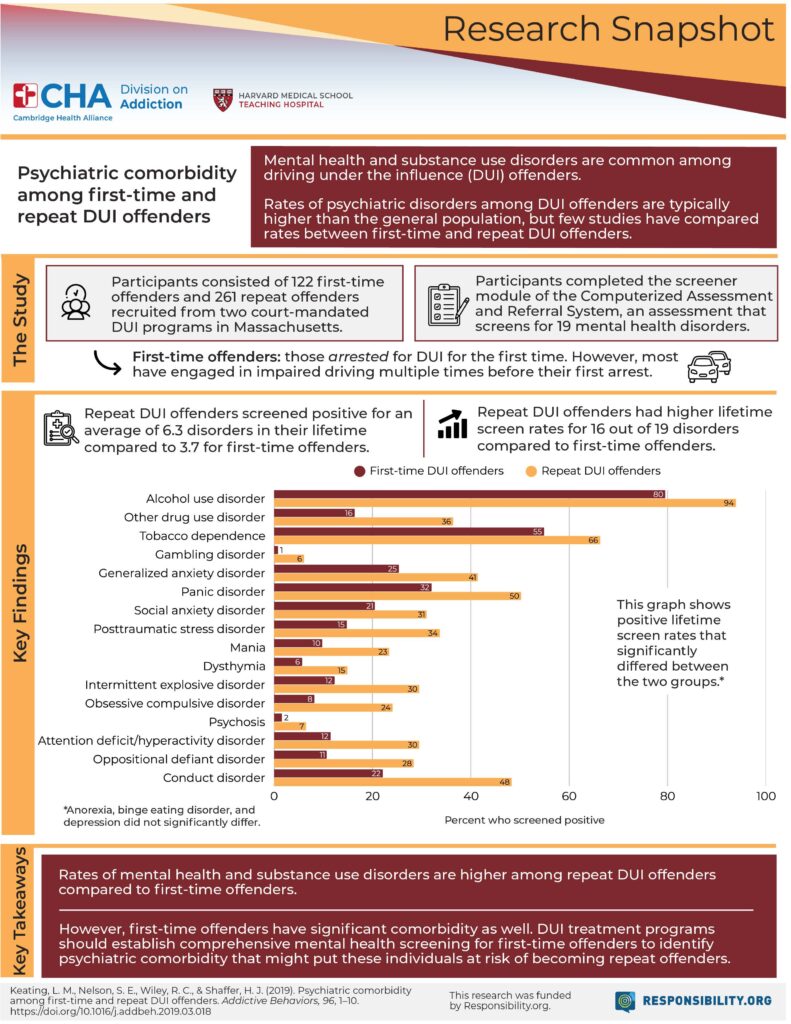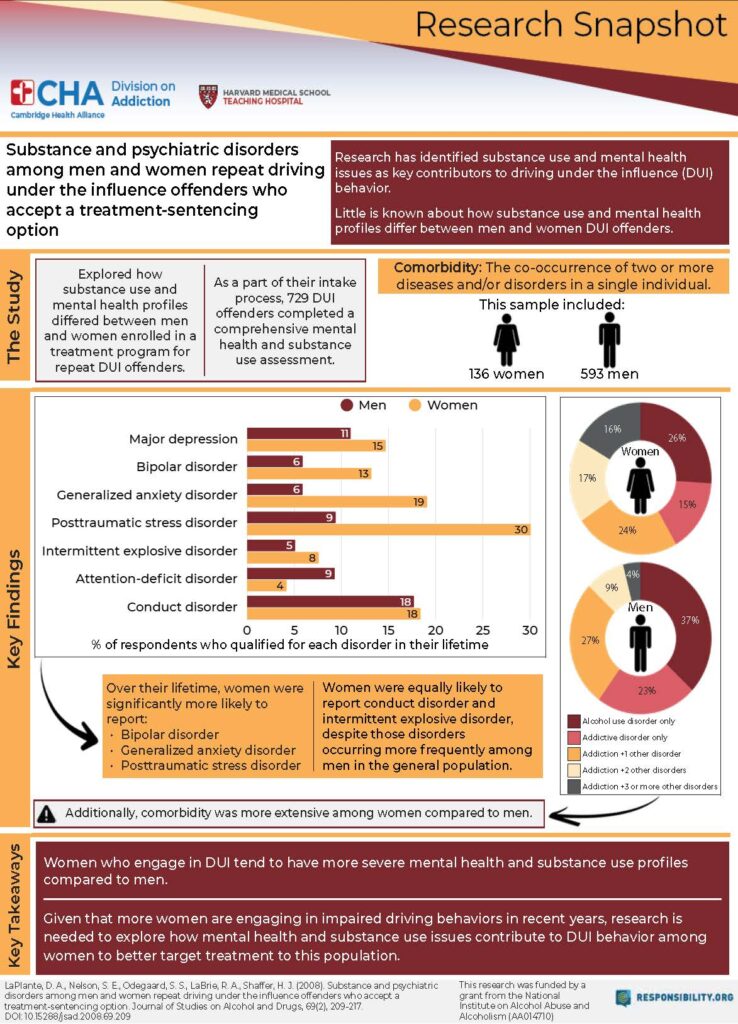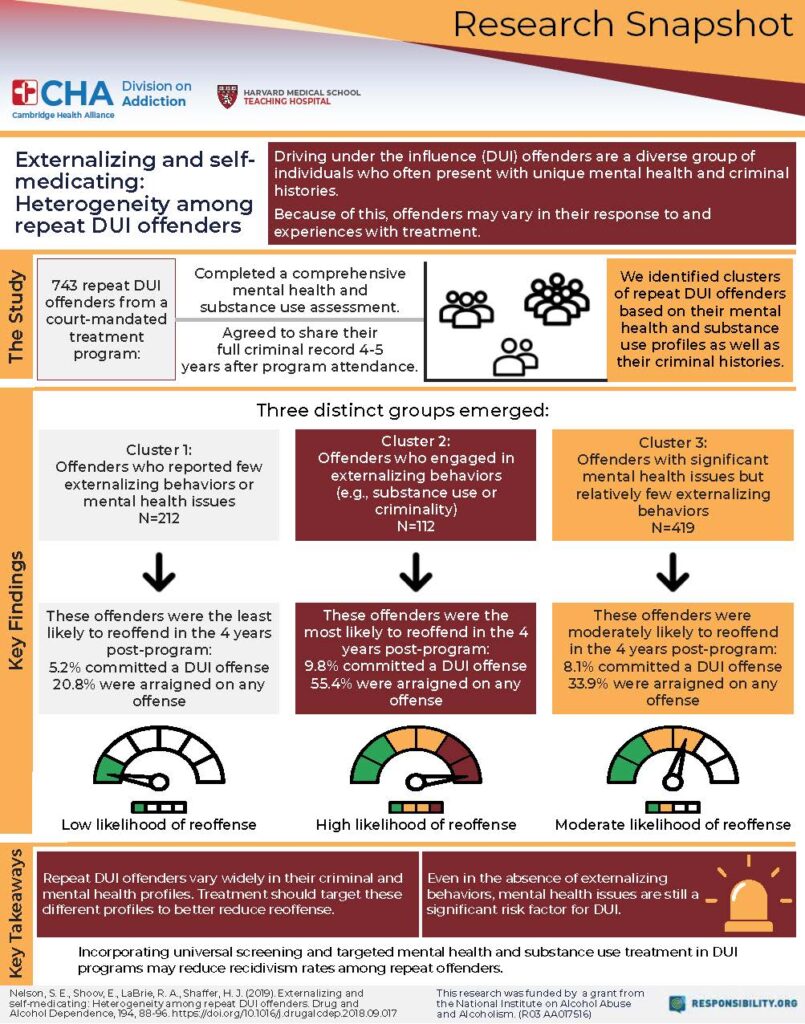Responsibility.org believes education is key to making the individual decisions that add up to a lifetime of alcohol responsibility. To advance alcohol responsibility, Responsibility.org must continue to address emerging risks, target interventions and expand collaboration among stakeholders. Overconsumption of alcohol can negatively affect an individual’s mental health in a number of ways – changes in brain chemistry, hangovers, life challenges, etc.
- 47% of consumers agree that “alcohol consumption has an impact on their mental health.”
(Source: APCO Insights, Alcohol Consumption Tracking Study, 2024, Commissioned by Responsibility.org) - 64% of consumers and 75% of healthcare workers see “using alcohol to deal with stress, anxiety, or mental health issues” as a risk factor to drinking in excess of recommended guidelines.
(Source: APCO Insights, Alcohol Consumption Tracking Study, 2024, Commissioned by Responsibility.org; Reputation, Inc., Alcohol Responsibility and Mental Health Benchmark, 2024, Commissioned by Responsibility.org)
The relationship between mental health and alcohol misuse is growing in significance and therefore opportunities exist for Responsibility.org to educate and advocate for screening and treatment. We want to be sure we not only explain what mental health is but offer resources for those seeking further education on this topic.
While not always related to mental illness, mental health conditions are among the most common health conditions in the United States.
58.7M
In 2023, nearly 1 in 4 adults aged 18 or older had a mental illness (mental, behavioral or emotional disorder excluding developmental or substance use disorders) in the past year, including 14.6 million who had a serious mental illness.
17%
(or 48.5 million) of Americans (12-years of age or older) met the diagnostic criteria for a substance use disorder (SUD), including 28.9 million with an alcohol use disorder and 27.2 million with a drug use disorder (e.g., tobacco, cannabis and other drugs) in the past year, and the majority were untreated.
20.4M
adults, 18 or older, had a co-occurring mental illness and substance use disorder.
Seeking professional help when needed can be crucial to maintain mental health and well-being. In 2023, 59.2 million adults report receiving mental health treatment, and 11.7 million adults aged 18 or older received substance use treatment.
Source: SAMHSA, 2023 National Survey on Drug Use and Health, 7/2024
More statistics about the prevalence of mental illness are available here.
Help is available. If a mental health or substance use challenge is affecting you or someone you know, there are many resources available including helplines, online support groups, apps and in-person counseling, etc. Explore the resources below to learn more or get connected with help. For medical advice or diagnosis, consult a physician or other professional.
Mental Health Resources for Individuals
Helplines and Treatment Resources
- 988 Suicide and Crisis Lifeline: Offers 24/7 judgment-free support for mental health, substance use, and more. Text, call, or chat 988.
- SAMHSA’s National Helpline or 1-800-662-HELP (4357): A free, confidential, 24/7, 365-day-a-year treatment referral and information service (in English and Spanish) for individuals and families facing mental and/or substance use disorders.
- Veterans Crisis Line: Free and confidential support for veterans and their loved ones to call, chat or text to connect with a qualified responder. Dial 988 then press 1 or text 838255.
- FindTreatment.gov: A confidential and anonymous resource for persons seeking treatment for mental and substance use disorders in the United States and its territories.
- Psychologist Locator: A tool developed by the American Psychological Association to make it easy for you to find practicing psychologists in your local area.
- SAMHSA- Find Support: Resources from the Substance Abuse and Mental Health Services Administration to help find health care or support for issues with mental health, drugs, or alcohol.
- Additional support and resources might be available through your employer’s employee assistance program (EAP).
Screening and Assessment Resources
- AlcoholScreening.org: A screening too for individuals to assess their own and others’ alcohol drinking patterns to determine if it is likely to be harming their health or increasing their risk for future harm.
- CARS Training Center: Responsibility.org in partnership with the Cambridge Health Alliance, Division on Addiction a Harvard Medical School teaching affiliate developed the free Computerized Assessment and Referral System (CARS) screening and assessment to be used by physicians, mental health professionals, first responders and veteran service organization to identify substance use and mental health disorders and connect people to treatment resource.
Substance Abuse Resources
- National Institute on Alcohol Abuse and Alcoholism Navigator: The NIAAA Alcohol Treatment Navigator® has been developed by the National Institute on Alcohol Abuse and Alcoholism (NIAAA), a part of the National Institutes of Health. The NIAAA is the lead U.S. research agency studying the causes, outcomes, prevention, and treatment of alcohol-related problems.
- Substance Abuse and Mental Health Services Administration Helpline: SAMHSA’s National Helpline is a free, confidential, 24/7, 365-day-a-year treatment referral and information service (in English and Spanish) for individuals and families facing mental and/or substance use disorders.
Additional Resources on Alcohol and Mental Health
- National Institute of Health- Emotional Wellness Toolkit: A collection of tools with tips for coping with feelings, traumatic events and depression.
- National Institute of Mental Health- Factsheets: Information on mental disorders and related topics for the general public, including patients and their families, health professionals, and other audiences offered in English and Spanish.
- National Institute on Alcohol Abuse and Alcoholism- Alcohol’s Effects on Health: Science-based information on the effects of alcohol on health from National Institute on Alcohol Abuse and Alcoholism.
- NIAAA Treatment Navigator: Resource from the National Institute on Alcohol Abuse and Alcoholism to help adults find alcohol treatment for themselves or an adult loved one.
Mental Health Resources for the Hospitality Industry
Members of the hospitality industry serve diners, patrons and guests with a goal of making sure they have a great time and enjoy the experience. These same workers work long hours in high-pressure environments, which can lead to unhealthy consumption of alcohol and drugs as a means of coping with stress. It is important for individuals working in this industry to be provided specific tools and resources to support their mental health.
Hospitality Industry Statistics
- Nearly 1 in 5 employees in the hospitality industry reported the use of illicit drugs within the past month, the highest rate of any industry. (SAMHSA)
- 12% of hospitality employees engaged in heavy alcohol use during the past month. (SAMHSA)
- 17% of hospitality industry employees were diagnosed with a substance use disorder, the highest rate of any industry. (SAMHSA)
- 84% of food, beverage and hospitality workers reporting that they feel stress from their job and 65% of those workers reporting using substances at work. (CHOW)
Hospitality Support Groups and Resources
- Culinary Hospitality Outreach Wellness (CHOW): A non-profit mental health and wellness support group for people who work in food, beverage, and hospitality.
- Southern Smoke- Behind You: No-cost counseling for food and beverage workers.
- Ben’s Friends: A coalition for sober people in the food and beverage industry committed to their sobriety in an industry filled with drugs, alcohol, and stress.
Mental Health Resources for Judges and Practitioners
Understanding and addressing the connection between impaired driving and mental health is essential to reducing repeat offenses and improving long-term outcomes. These research snapshots — developed by the Division on Addiction at Cambridge Health Alliance, a Harvard Medical School teaching hospital — highlight key studies that informed the development of the Computerized Assessment and Referral System (CARS).
Each one-pager summarizes peer-reviewed research on psychiatric and behavioral health issues among repeat DUI offenders, reinforcing the need for screening, referral, and treatment as part of a comprehensive impaired driving response.
Mental Health Resources for Parents and Families
As parents, it is important to encourage your kids to develop good practices for supporting their mental health. Whether it is checking in on how your kids are feeling, modeling appropriate coping strategies or connecting your kids to a mental health professional, parents can do a lot to support their kids’ mental health during this important time in their lives. Below are some resources that can help you with conversations with your kids around mental health.
Resources for Parents and Families
- National Alliance on Mental Illness- Kids, Teens, and Young Adults: Essential information and resources intended to help young people get the mental health support they need.
- National Institutes of Health Emotional Wellness Toolkit: Includes tips for coping with feelings, traumatic events.
- Children and Mental Health: Is this Just a Stage: Resources and information the National Institute of Mental Health about mental health disorders and children.
- Center for Parent & Teen Communication: Information for families and teens to strengthen family connections and encourage conversation about a number of topics relating to emotional health.
- Partnership to End Addiction – Is My Child at Risk: A risk assessment to help parents better understand their risks related to mental health.
- You Are Okay – Mental health is different for teens and young adults. Created by the Child Mind Institute, You Are Okay is a digital resource for teens and young adults navigating mental health issues, designed to help individuals get answers, find the words to describe how they are feeling, and to empower them in life in general.
- Ask, Listen, Learn: Kids and Alcohol Don’t Mix: Resources to help parents talk about the risks of underage drinking and underage marijuana use, with a new section on mental health and substance use.
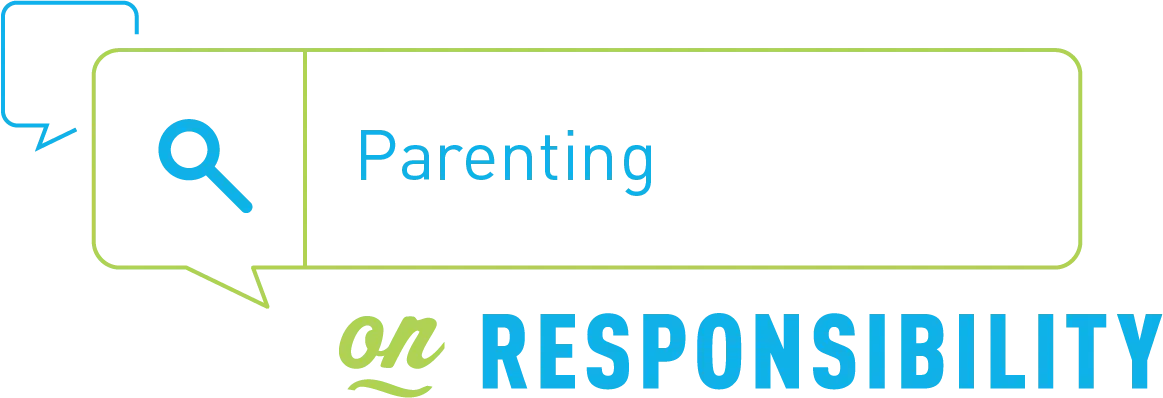
Teenagers are faced with countless pressures – on top of academics, sports, and extracurriculars, kids today are growing up with technology, social media and increased stress and anxiety. Navigating these years with your kids can prove overwhelming for any family; giving them the tools to make good decisions despite the pressure and stress they may face is crucial.
On Responsibility is a video series featuring unique leaders in parenting and beyond. Our experts offer thoughtful and practical advice to parents as they navigate the teenage years with their kids, sharing skills and tips they’ve learned to help raise responsible teenagers.

Opening Up about Mental Health with Olivia Carter
“Conversations about mental health are not just a one-time thing. The more we validate our children’s emotions, the stronger the connections and sense of safety become.”
Watch Now
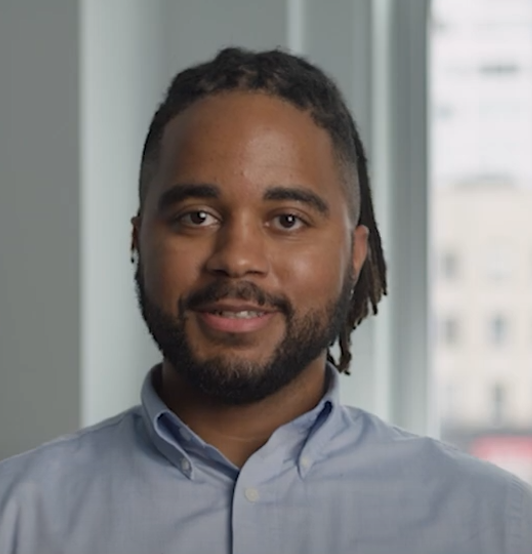
Talking to Kids about Anxiety with Dr. Ryan DeLapp
“Parents may notice that their child is especially struggling with anxiety if there’s a notable change from their baseline.”
Watch Now

Supporting Your Kids’ Mental Health with Phyllis Fagell
“It is critical when working with kids who are suffering… that we help them identify the coping strategies that will enable them to manage big feelings.”
